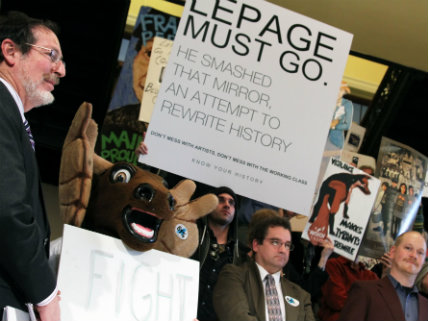Maine Gov. Paul LePage's 'Binder of Drug Dealers' Shows He Was Lying About the Race of Arrestees
Hoisted by his own scrapbook petard.

Maine Gov. Paul LePage claimed last month that he had a three-ring binder showing that 90 percent of the suspected drug dealers arrested in the state were black or Hispanic. The binder, unbelievably, turns out to be real, but LePage's statistics—much more believably, considering the state is almost 95 percent white—do not.
LePage made headlines in August when he declared that "people of color or people of Hispanic origin" were "the enemy" in the drug war. Facing accusations of racism, LePage tried to tamp down the controversy by calling a state lawmaker a "little son of a bitch socialist cocksucker" and claiming he had the statistics to back his comments up.
"Let me tell you this, explain to you, I made the comment that black people are trafficking in our state, now ever since I said that comment I've been collecting every single drug dealer who has been arrested in our state," LePage said at a town hall event in August. "I don't ask them to come to Maine and sell their poison, but they come, and I will tell you that 90-plus percent of those pictures in my book, and it's a three-ringed binder, are black and Hispanic people from Waterbury, Conn., the Bronx and Brooklyn."
In an impressive piece of public records trolling, the Maine ACLU immediately put in a freedom-of-information request for LePage's binder. Lo and behold, it really exists. The governor's office released the contents of the binder—about 150 pages of mostly news clippings and press releases—to the ACLU and media outlets Monday morning.
But the binder doesn't back up LePage's claim. It demolishes it.
According to the the Portland Press Herald:
Of the 93 people pictured in the binder, 37 appear to be either black or Hispanic, or about 40 percent of all the photos, while 56, or about 60 percent, appear to be white […]
His office has repeatedly sought to explain that LePage was specifically referring to out-of-state heroin dealers when he described the race of those arrested, not to dealers in other drugs like methamphetamine, whose photos also are in the binder.
But the photos of the 51 people facing heroin or other opioid drug charges show that only 47 percent, or 24 individuals, appear to be black or Hispanic. The remaining 53 percent, or 27 people, are white. Other press releases in the binder report the names of people charged with heroin trafficking but do not include booking mug shots.
In a statement, Alison Beyea, the executive director of the ACLU of Maine, said that "whether or not [LePage's] assertions were deliberately misleading, they were dangerous and racist."
"The governor has multiple agencies at his disposal that collect arrest data in Maine," Beyea continued. "It is outrageous that he would rely on an incomplete collection of newspaper clippings and emails to make false, inaccurate accusations about people of color. It's time for the governor to stop using people of color as a scapegoat for Maine's drug problem, and to start proposing real solutions based on actual facts."


Show Comments (57)